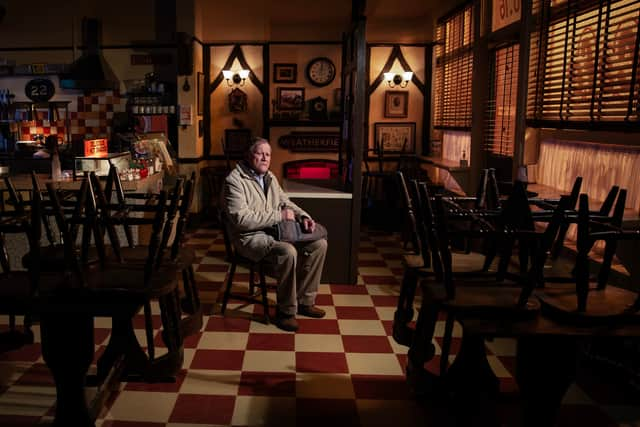Coronation Street: panic among soap opera cast as execs limit actors in storylines amid ITV budget cuts
and live on Freeview channel 276
Coronation Street executives have caused widespread panic among the cast by limiting the number of actors that can feature in each of the soap’s storylines.
According to sources, ITV executives are reducing expenses by taking a "minimal" stance and reducing group scenes, like those in the Rovers Return, in order to cope with declining budgets.
Advertisement
Hide AdAdvertisement
Hide AdSources said that instead of reducing the number of episodes that air each week, the ITV soap opera, which has just over three million viewers, has chosen to adopt a more streamlined approach due to pressure from its bosses.
But some of the long-running programme’s stars - many of whom are paid by the scene - have expressed concern at the move, having noticed a change in the scripts last month.
While many veteran actors like Bill Roache and Barbara Knox, who portray Ken Barlow and Rita Tanner, receive full salary and compensation for all of their work, the majority of the cast receives payment for the time they spend filming, though they are guaranteed a set minimum of work.


There have also been recent reports that show executives have reduced the amount of extras utilised in scenes and increased instances of "back-to-back" filming, in which actors arrive on set at 7am and work full days.
Advertisement
Hide AdAdvertisement
Hide AdThey are reported to have emphasised the significance of minimising the impact on fans in meetings with senior executives, but because actors are working longer hours when they are on set and spending more time off it, the change has severely damaged cast morale.
“The bosses have decided we will take a far more minimal approach to storylines going forward,” a source told The Mirror, “and are cutting the number of actors who appear in them.
“As large numbers of the cast are paid by scene, that means paying fewer actors to be on set. The changes haven’t gone down well with the cast. Many of them are panicking about what these cuts mean for their futures.
Advertisement
Hide AdAdvertisement
Hide Ad“The Corrie cast is absolutely massive – it has well over 50 cast members in total – and some of them haven’t filmed for weeks, so they are starting to get really worried about the axe falling on them before long.
“There is currently a real feeling of disquiet behind the scenes and people are openly sharing their concerns.”
Bosses save money on travel expenses, such as driving actors to the set, hair, makeup, and lighting, if fewer actors are used in a scene.
The source added: “The more these costs are reduced, the more likely it is that we can meet them with our in-house team, whereas previously the show has leaned heavily on freelance help, which is much more expensive.”
Advertisement
Hide AdAdvertisement
Hide AdAnother source said: “In the past, actors would come in for short periods over a number of days. But now they are in from 7am until late, filming back-to-back scenes, and could be standing in when in the past extras might have been used.
“But then they might be off set for ages. The bosses are clearly trying to cut down on additional costs that are deemed surplus to requirements, which makes a lot of sense when you look at the pressures being felt all across the industry. But it has been quite unsettling for the cast and crew, and it feels like a very uncertain time.”
Corrie is a cornerstone of British television culture, having been on the air since 1960, and the quintessential British soap opera set in the fictional working-class community of Weatherfield - a suburb of Manchester - has become ingrained in the fabric of British society over the decades.
For fans, these changes could have both immediate and long-term implications. In the short term, they may notice a reduction in the size of group scenes, such as those at the iconic Rovers Return pub, as well as fewer characters appearing in each episode.
Advertisement
Hide AdAdvertisement
Hide AdThis could alter the dynamic of the show and affect the development of storylines, and in the long term, fans may see shifts in the overall quality and production value of the series as it grapples with budgetary constraints.
While Coronation Street has a long history of resilience and adaptation, these changes underscore the challenges faced by traditional television programming in an increasingly competitive and evolving media landscape.
Comment Guidelines
National World encourages reader discussion on our stories. User feedback, insights and back-and-forth exchanges add a rich layer of context to reporting. Please review our Community Guidelines before commenting.
